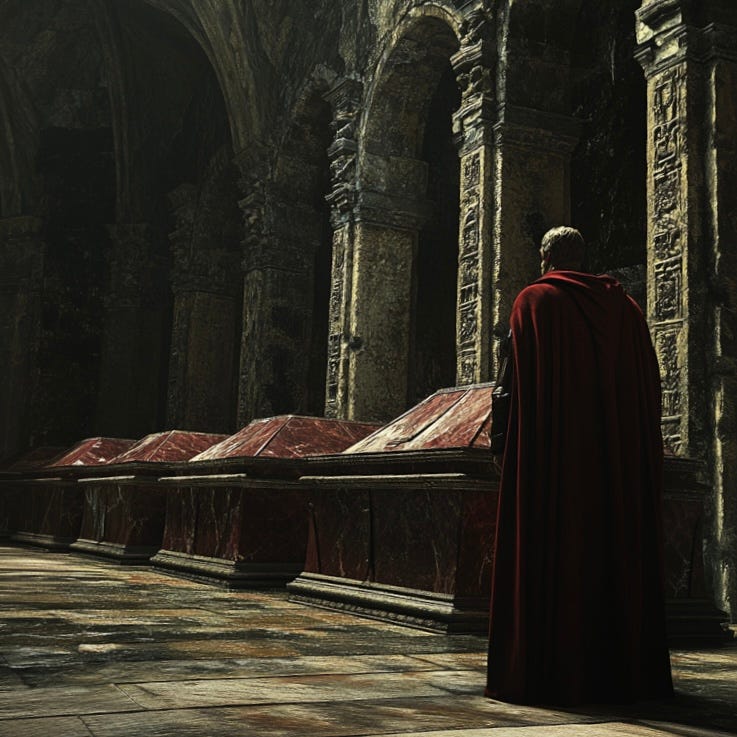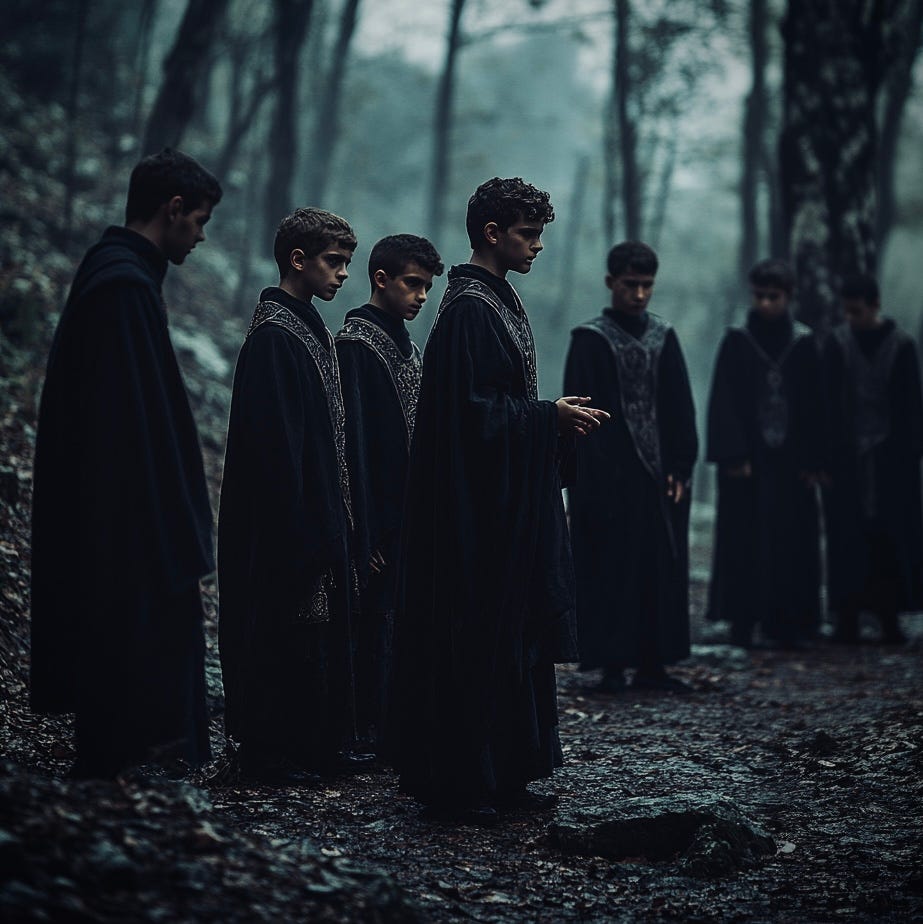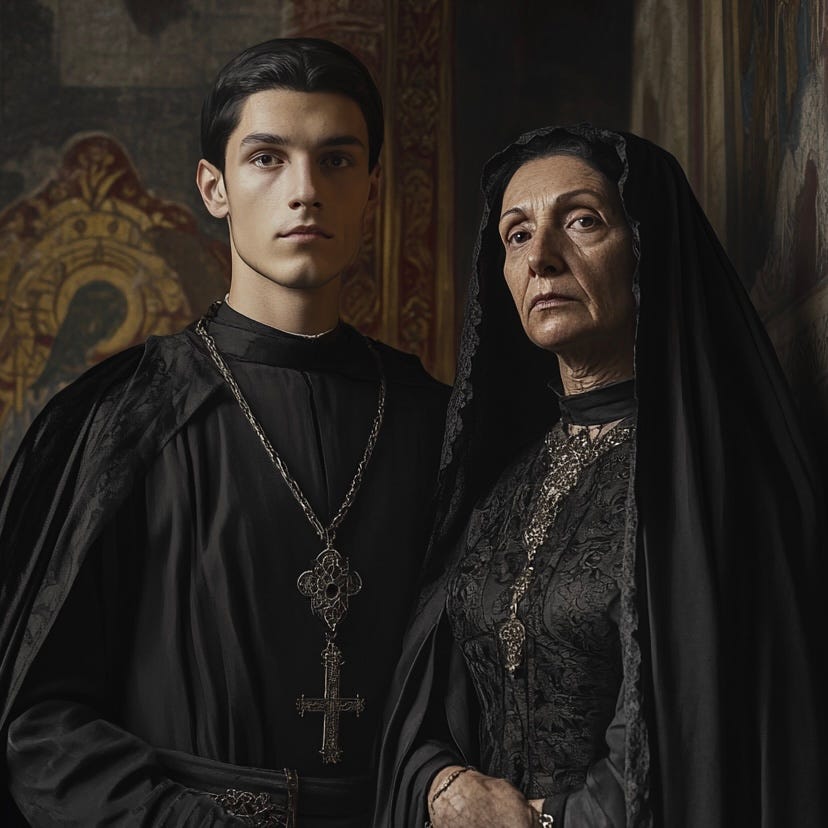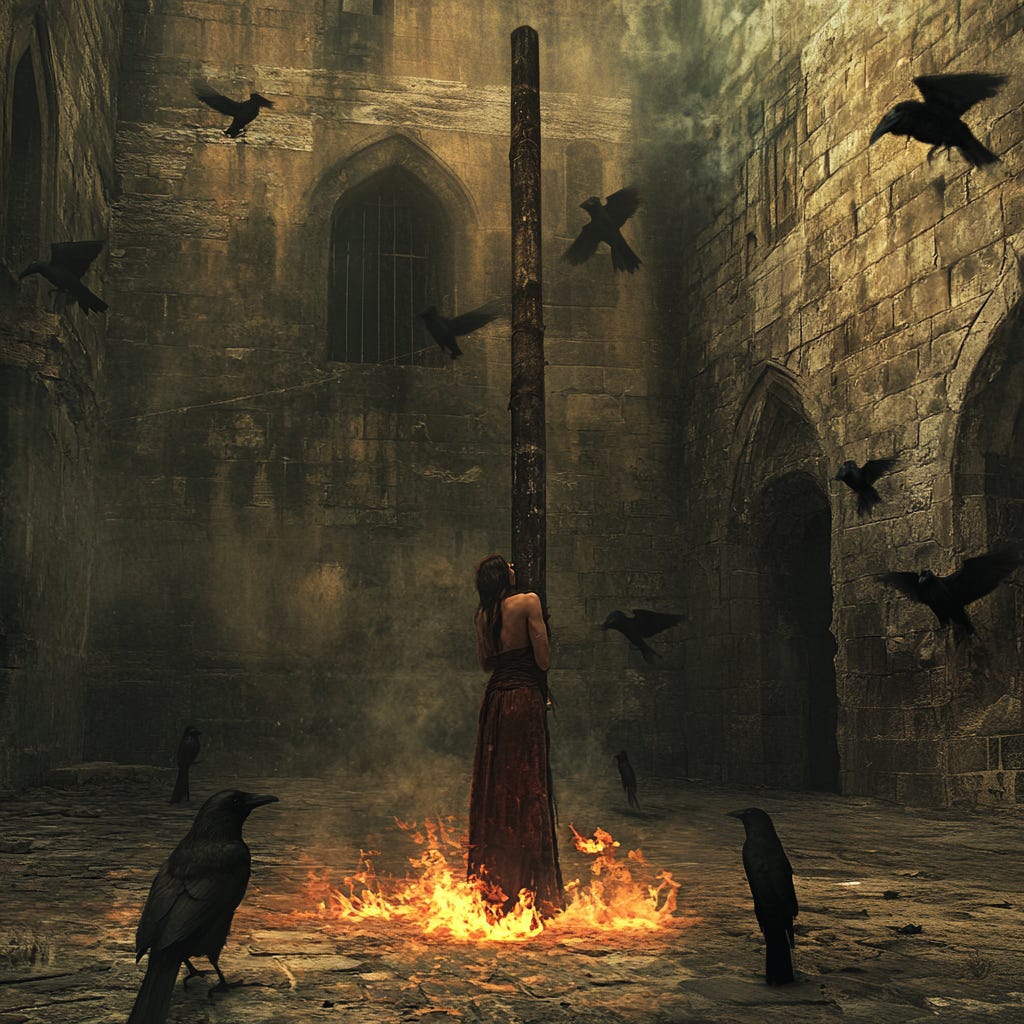“Die zwölf Brüder” (The Twelve Brothers) was story number 9 in the 1812 edition of Kinder- und Hausmärchen (Children’s and Household Tales) of the Brothers Grimm. It was omitted from later editions due to its brutality and some racier passages that Wilhelm found objectionable.
Some scholars categorize the story as a folk tale rather than a fairy tale. It was said to have been related to the Grimms by Charlotte and Julia Ramus, who were the daughters of a French pastor.1 The following adaptation sets the tale in ancient Dalmatia in the Byzantine period.
The Twelve Brothers
Once upon a time a strategos (general) from Constantinople named Nikēphóros governed the Imperial Theme of Dalmatia from a castle perched on a ridge of the Dinaric Alps. His beautiful wife, Theodōra, daughter of an Antiochene logothete (minister of state), bore him twelve children, all males, whom he named after the twelve sons of Blessed Iákobos.
One day, his wife informed him that another child lay on the horizon. So Nikēphóros kissed her, embraced her, and conducted her down the limestone steps into the castle’s labyrinthine catacombs. The soaring columns on either side of them were awash in the glow of torches and flaming cressets.
“Long ago,” Nikēphóros said, “I stood on the docks of Jadera, preparing to cross the Adriatic to Ravenna. A weird woman made her way through the ranks and gave me a plum. ‘What is this about, mother?’ I inquired, accepting it. She told me that I would sire twelve sons. And if the thirteenth were a boy, my line would flourish till the End Times. But if it were a girl, a calamity would befall my house that could only be averted by slaying my twelve sons.”
They entered a vaulted gallery. And in her consternation, Theodōra lingered near the door. Ranged on either side were six porphyry sarcophagi, each crowned by a peaked lid that would have required a great machine to lift. Nikēphóros trod to the center of the chamber.
“If my thirteenth child is a boy,” he said, “I shall rejoice and command this room to be sealed. But if it is a girl, I will personally bind each son’s limbs, as Abraám did to the Child of Promise on Moriah Mount; and I will lay him down in his sarcophagus. And the porphyry lids will be lowered; and the twelve brothers will be buried alive.”
After this, Theodōra wept continually when she considered the bitter fate that awaited her sons should a daughter be born to her. One day, in the seventh month of her expectancy, she gave way to her emotions in the presence of her youngest son Beniamín. In his innocence, he asked her what was wrong.
She told him what his father intended to do if she gave birth to a girl. Then she led the boy into the catacombs to show him the room with the twelve sarcophagi.
“Warn your brothers, Beniamín,” she said. “Tell them to flee the castle and hide in the wilderness till the baby is born. If it is a boy, you will see a white banner fluttering from the highest tower. But if it is a girl, a red banner will appear. And if that happens, you and your brothers must return to this place.”
Beniamín conveyed all their mother had told him to his brothers. So they Gathered up enough supplies to survive for some time in the woods; and fled under the cover of darkness.
They bivouacked in a wooded grove and took turns climbing the tallest tree, which provided an unobstructed view of the castle. One afternoon, a trapdoor opened on the rooftop of the highest tower; and a banner on a horizontal crossbeam emerged from the hole. It was Beniamín who was keeping watch.
At first he thought it was the effect of the sun’s vermillion rays glancing off the white cloth that made it seem so lurid. But the longer he stared at it, the less he could deny the testimony of his eyes. The banner was red. He shinnied down the tree and ran off to tell his brothers.
Roubén, the oldest of the twelve, saw the alarm in his brother’s face.
“What’s wrong?” he asked.
“It is as we feared. Mama has given birth to a girl.”
Dán, the most impatient of the twelve, fumed. “This is outrageous! that we should killed on account of a girl!”
The others nodded their assent.
“Then let us take a vow,” Roubén said. He formed the gesture of the schwurhand with his index and middle finger extended. When his brothers had done the same, he led them in an oath. “From this moment on, we shall slit the throat of every girl we meet until her blood flows as red as the banner that has condemned us to a life of hardship.”
When they had sworn the oath, the twelve brothers went to sleep for the night. Next morning, they heard dogs baying in the distance. So they hastily bundled up their bedding, tamped down the coals of the fire, and plunged deeper into the forest, taking a mountainous route they knew would be difficult for the horses to follow.
After many hours they came to a villa on a lake that was believed to be haunted by the ghosts of twelve brothers who had been buried alive there by their father. Roubén told the others that they would make this their home. “And when people come snooping about, we’ll pretend we’re the ghosts of the murdered brothers to frighten them off.” The others thought this was a clever idea.
Since Beniamín was the youngest, Roubén said he would have to remain at the villa while they hunted and foraged for food.
“You’re little,” they all said, “and we can’t bear the thought of losing you to a wild beast.” So it Beniamín remained at the villa and washed, cooked, and cleaned for the twelve of them during the day. Whenever he wanted to enjoy himself alone, he went to the lake to fish.
When Theodōra’s daughter was born, the midwife handed the baby to her, pointing out that there was a glowing star embedded in the newborn’s forehead. Nikēphóros interpreted this to mean that God had found a way to slay his sons so that he would not have to. So he called off the hunt; and took the bold step of giving the girl the pagan name of Astraía, meaning “Starry One.”
When Astraía was twelve years old, she saw her mother crying in the same room where she had last seen her beloved son Beniamín. Astraía begged her to explain. Theodōra told the girl that she had once had twelve brothers; and that her father had intended to slay them if the thirteenth child were a girl, as had in fact transpired.
Astraía sensed that her brothers were still alive and assured her mother that she would find them, asking only to be given twelve shirts that had once belonged to them. At dusk, she left the castle, clutching the shirts to her breast. As she entered the forest she could the antiphonal voices of the monks and nuns behind her in the castle singing the Fōs Ilaron (Hymn of Gladsome Light).
The star in her forehead lit the way once it became dark. And when the moon rose, the stars in the sky twinkled in sympathy with it and guided her to the villa.
She arrived in the morning. The older brothers were hunting and gathering in the forest. She saw a young man in a tunic, which he had tied up at the knees so he could wade in the shallows of the lake. He stood ankle-deep in the water, holding a spear in one hand by which he was trying to lance a fish. But when he looked up and saw Astraía, he fell backwards with a splash.
She laughed and asked his name was. He said it was Beniamín. And when she explained that she was his sister, he dropped the spear, sprinted out of the water, and embraced her. She showed him the twelve shirts, all of which he recognized. He begged her to come inside.
They caught up on old times. But as the sun began to sink Beniamín became depressed. He told her about the oath they had taken to kill any girl they met. He was afraid his brothers would not give him a chance to explain who she was when they returned.
Astraía had an idea. She went to the kitchen and prepared twelve sweet cakes. When she had made these, she confided to Beniamín her plan. Then she climbed into an oak chest that stood against the wall of the dining hall, and closed the lid.
When the eleven brothers returned, they were famished and ate their supper without speaking. They had poor table manners and wiped the food from their mouths with their hands. Beniamín brought the twelve sweet cakes to the table, and sat down to enjoy the dessert with them.
When they had tasted it they were amazed and inquired as to how he had made it.
“Someone taught me.”
“Who?!” they asked.
“It was a girl. If I reveal to you her identity, you must swear you will not kill her.”
Roubén made the gesture of the schwurhand, and the brothers swore the girl would be safe.
Beniamín went to the chest. “Then allow me to introduce our sister!”
Astraía climbed out, and the brothers ran to embrace her. Roubén said they would not have harmed her, because the star in her forehead made it obvious she was blessed. She told them how much their mother missed them. They wept when they heard this and said they wanted to see her too. But they could not go back as long as their father was alive.
Astraía remained in the villa with them. And they lived happily together for seven years. She taught them the graces and manners that they had lacked. And since Beniamín was older now and had someone to help him, he was able to join his brothers when they went into the forest each day to hunt and forage.
One afternoon while her brothers were out, Astraía went to a garden behind the villa. She found twelve beautiful lilies growing out of the dirt. She thought these would be nice gifts for her brothers. So she plucked them. But when she did this a rumble of thunder was heard in the distance; and dark clouds rolled in from every direction.
An old woman dressed in black came out of the woods and gave her a plum. When she accepted it, the woman spoke: “Long ago the master of this villa buried his twelve of sons alive beneath this garden. The lilies that you plucked were their souls. As a consequence, your own brothers have been transformed into ravens.”
When she said this, Astraía heard the flapping of wings and saw twelve ravens circling the villa. She cried out to them, but they took off across the lake and vanished over the treetops. “Please!” she said. “I love my brothers. There must be a way to break the curse.”
“There is one way—a hard one. You must take a vow of silence, neither to speak nor to laugh for the duration of seven years. If you violate this oath by even one second, your brothers will instantly die.”
And so Astraía made the gesture of the schwurhand, and vowed that the last words she would speak for seven years would be the very words she was uttering to affirm the oath.
With her brothers gone, there was no reason for her to remain at the villa. So she abandoned it and returned to the castle. But when she arrived, everything had changed.
The Emperor in Constantinople had sent a new strategos to take charge of the Theme of Dalmatia. Her father Nikēphóros had been beheaded; and the tongue of her mother Theodōra had been cut out. After that her mother was despatched to the Monastery of Saint Euphemia in Chalcedon, where she lived out the rest of her days in prayer and contemplation.
The new strategos, whose name was Mikhaḗl, was acclaimed throughout the land for his justice, piery, and mild disposition. He was young and very handsome. He fell in love with Astraía and took her as his wife. But Mikhaḗl’s mother hated the girl and was unimpressed by the star in her forehead.
Soon Mikhaḗl’s mother grew weary of hearing her son praise his wife’s alleged virtues and meekness. “If she is so virtuous,” she said, “why does she refuse to speak. I can understand why her mother no longer speaks. But this vixen still has her tongue in her mouth.”
When his mother berated his wife in this manner, Mikhaḗl’s visage darkened and he told her that if she did not hold her peace, he would have her tongue cut out as well. This did not deter the wicked woman, who continued to slander Astraía, both privately and publicly, for seven long years. And one night she said something that gave even Mikhaḗl pause.
“I will grant that, perhaps, God has made her incapable of speech. And it is obvious she is not deaf. But why does she never laugh? I will tell you why. She is ashamed because she is a whore. She cannot laugh because her infidelities weigh heavy on her mind.”
To test his wife, Mikhaḗl told Astraía that, if she could not speak, then she could at least laugh off these rumors to prove them baseless. But his wife remained impassive. And so, with a heavy heart, the strategos ordered her to be burned at the stake.
On the day of her execution, Mikhaḗl looked down from the balcony with tears in his eyes. He still loved her very much. Astraía was brought up from the dungeon and lashed to the stake, face pressed against it, so that Mikhaḗl would not see her features contorted in pain as she died. The servants poured oil on the pyre; and used a torch to light it. But as the flames licked her skirts, the seven-year term expired that second and she was able to speak again.
Astraía heard the sound of flapping wings, as twelve ravens landed in the courtyard, transforming into her brothers. The twelve men stamped the fire out and untied the knots binding their sister to the stake.
This done, Astraía laughed and began to speak rapidly to them, telling them all that had happened. Mikhaḗl joined them in the courtyard. And when his wife shared her story with him her story, he too was amused. But as for his mother, he decided that justice must be served and condemned to death on the charge of nearly persuading him to kill the woman he loved.
The next day, his wicked mother was thrown into a cauldron of boiling pitch, while venomous snakes were dumped onto her from above. The snakes bit her face and coiled round her neck, thus prolonging her agony. It is said she suffered even more grievous torments in Hell. But the annals offer no details as to what precisely these were.
Zipes, Jack. The Brothers Grimm: From Enchanted Forests to the Modern World. New York: Palgrave Macmillan, 2002. p. 74.












It's interesting how the folk tradition evolves. Though there is no reference to the biblical story of Joseph and his brothers, the three named brothers in the story have names resembling Reuben, Dan, and Benjamin, the names of three of Joseph's brothers. I doubt that's coincidence. The connection seems to have no influence on the plot, though.
I was so ready for a neat little self-fulfilling prophecy, but this went in such a different direction! What a great story full of surprises. I love the change of setting, which gave it an even more intriguing aspect.